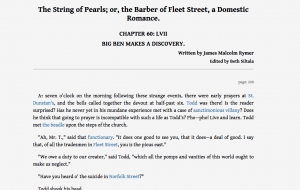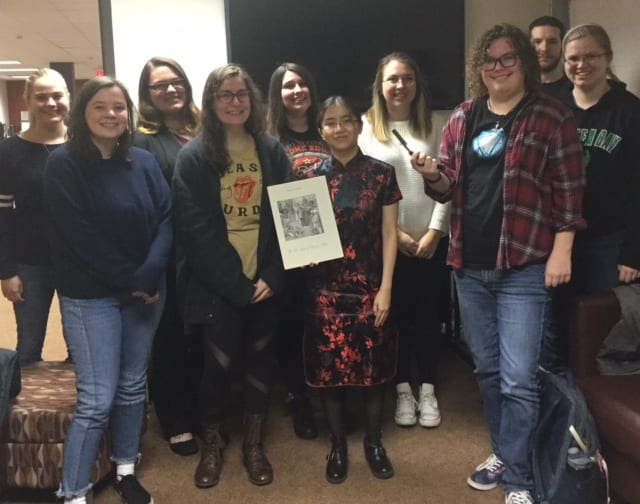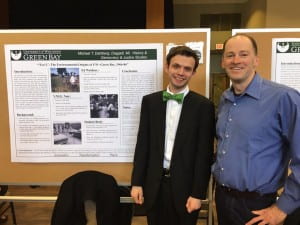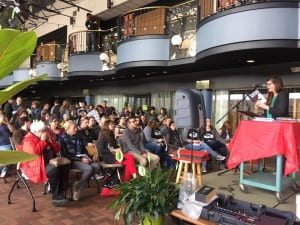Many of us are familiar with Sweeney Todd: The Demon Barber of Fleet Street. What most of us don’t know, is this story derives from the 1800s in the form of a penny blood, a “Victorian fiction serial targeting working-class family readers.” Professor Rebecca Nesvet, who specializes in British literature, found a digital facsimile of one of two copies of the compiled versions of The String of Pearls uploaded to the Internet Archive.
Nesvet found issues with its accessibility to the modern public, so she recruited Digital and Public Humanities students to help her solve some of those problems. One student had this to say about the project:
“I am Beth Siltala, and I am an editor of the Sweeney Todd Project. The project is a large-scale and long-term. There are about 170 chapters in this printed work, and we currently are only at chapter 60. I have been editing chapters and creating well researched annotations for about three semesters now under the guidance of Dr. Rebecca Nesvet at UW-Green Bay. I first started this project in a class for my Digital and Public Humanities major, learning Extensible Markup Language (XML) and the Text Encoding Initiative (TEI). We were assigned chapters to edit, and then publicly post them on http://www.salisburysquare.com/TSOP/. You can do a lot when annotating a text, like make it very educational or humorous. It just really depends on what the editor wants the readers to get out of the text. Sometimes, in the original text there are moments when the printers make spelling errors, so the job of an editor is to go in and note where the spelling errors are for the publication of the digital edition, notifying the public that this is not an error as this is what was printed.

Before

After
I think the reason why I have been doing this project for three semesters now is because I enjoy doing it. It certainly is not like anything I have ever done before (not in high school or my first couple years at UWGB). I also love the story, so I wanted to be a part of it for a longer time than just one semester. I continued my involvement on the project for the next couple semesters. For my second semester on this project, I became a senior editor for the project in one class, helping junior editors (and Dr. Nesvet teach) with their chapters and coding. Many of the junior editors were shocked that I had only been working on this project for two semesters (at the time I was a senior editor). They were, however, grateful for the knowledge that I gave to them during the semester. Now, in my third semester (Spring 2018) I am an intern for this project. I am proofreading earlier chapters that were published at the early stages of the project. Plus, I am coding chapters to be published on the site. On April 20th, myself, Emma Ferron (another intern in the project), and Dr. Nesvet are going to present our project in the UW System Symposium for Undergraduate Research, Scholarly and Creative Activity. Not only is it to show the UW System what we are doing, but also to show our skills to the public. With this, we can show people what we are doing and why this project is such a big deal to the digital world.
This project has influenced my life a lot over the course of my academic career as a Humanities major, helping me develop my leadership skills and become more confident in my work. It has also enlightened me of a job possibility if museum and gallery work does not work out. I can be an editor or at least a proofreader for a publishing company if I want. The Digital and Public Humanities has shaped me into a person I did not know I could be. Sometimes it is hard to look back and see what would happen if I did not become a Humanities major. What would have happened if I followed another dream of mine and become a novelist? Or a paleontologist? Or even a visual artist? Would I be okay with that? Would I feel accomplished with my life? I don’t know. I do know that I am content with the path I am going down. Where that will lead me? I don’t know. Digital and Public Humanities is a new emphasis to have, and I think I can do a lot with it. I just have to get experience in the field to get to where I hope to be.”
The Digital and Public Humanities is one of the newest tracks in the Humanities major and focuses on creating easily accessible projects on digital and public platforms. You can view the press release for the project for more information on the String of Pearls: String of Pearls-1





